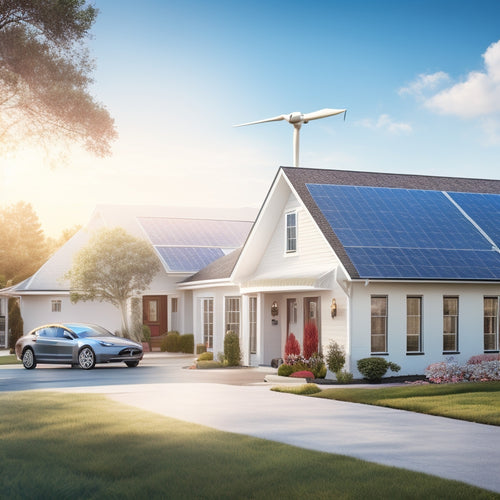
What Are the Best Home Electric Storage Systems
Share
You're contemplating investing in a home electric storage system to store excess energy from renewable sources, reduce grid reliance, and lower energy bills. Top brands like Tesla Powerwall, LG Chem RESU, Sonnen eco, and Generac PWRcell offer reliable solutions with varying capacities and features. When selecting a system, you'll want to assess key factors such as battery capacity, charge cycles, depth of discharge, and power output to guarantee peak performance. Evaluating these features and understanding system costs, ROI, and installation requirements will help you make an informed decision and maximize the benefits of your energy storage investment.
Key Takeaways
- Top-rated home energy storage systems include Tesla Powerwall, LG Chem RESU, Sonnen eco, and Generac PWRcell, known for their efficiency and reliability.
- Battery capacity, charge cycles, and depth of discharge are key features to consider when selecting a home energy storage system.
- Look for systems with high round-trip efficiency, long warranty life, and a strong reputation for reliability and performance.
- Proper system sizing, installation, and maintenance are crucial to ensure optimal performance and prevent safety hazards.
- Evaluating cost and ROI involves considering equipment quality, installation expenses, and available rebates and tax credits.
Understanding Home Energy Storage
You're likely considering home energy storage because you're tired of relying on the grid and want to employ the power of renewable energy sources like solar or wind.
To make the most of these sources, you need a reliable way to store excess energy generated during the day for use during the night or on cloudy days. This is where home energy storage systems come in.
These systems typically consist of a battery bank, an inverter, and a monitoring system. The type of battery technology you choose will greatly impact your system's energy efficiency and overall performance.
Popular battery technologies include lead-acid, lithium-ion, and saltwater batteries, each with their own strengths and weaknesses. When selecting a battery, consider factors such as depth of discharge, round-trip efficiency, and warranty life.
A well-designed home energy storage system can considerably reduce your reliance on the grid, providing you with a reliable source of power and potentially saving you money on your energy bills.
Top Brands and Models Compared
With a solid understanding of home energy storage systems, it's time to investigate the top brands and models available. You're likely looking for a reliable and efficient solution to power your home.
When it comes to brand reliability, you want a manufacturer that stands behind their product and provides quality customer support. Model efficiency is also essential, as it directly affects the overall performance of your energy storage system.
Here are some top brands and models to explore:
-
Tesla Powerwall: Known for its sleek design and high efficiency, the Powerwall is a popular choice for homeowners. With a capacity of 13.5 kWh, it's suitable for small to medium-sized homes.
-
LG Chem RESU: This high-capacity battery offers up to 12.8 kWh of energy storage, making it ideal for larger homes. LG Chem is a well-established brand with a reputation for reliability.
-
Sonnen eco: This German-made battery is designed for high-performance and longevity. With a capacity range of 2-16 kWh, it's suitable for various home sizes.
- Generac PWRcell: This modular battery system offers up to 17.1 kWh of energy storage, making it an excellent option for larger homes and commercial applications.
Key Features to Consider
When sizing up a home energy storage system, it's important to drill down into the key features that'll make or break its performance. You'll want to take into account the battery capacity, which is typically measured in kilowatt-hours (kWh). This determines how much energy the system can store and provide to your home during an outage. A higher capacity means more power and longer backup times.
Another significant factor is the number of charge cycles the battery can handle. A charge cycle refers to one full discharge followed by a full recharge. Look for systems with a high cycle life, typically above 3,000 cycles, to guarantee your battery remains efficient over its lifespan.
Additionally, reflect on the depth of discharge (DOD), which affects the battery's overall health and lifespan. A higher DOD means the battery can be drained further before recharging, but may reduce its overall lifespan.
You should also evaluate the system's power output, usually measured in kilowatts (kW). This determines how many appliances you can run simultaneously during an outage.
Cost and ROI Analysis
As you've assessed the key features of a home energy storage system, it's now imperative to examine the financial implications of your investment. The cost of an energy storage system can vary widely, depending on the type and quality of the equipment, as well as the installation costs.
However, there are several financial incentives that can help offset the upfront costs. For example:
- The federal solar investment tax credit (ITC) allows you to claim a tax credit of 26% of the total cost of your energy storage system.
- Many states and utilities offer rebates and incentives for energy storage systems, which can help reduce the upfront cost.
- Energy storage systems can increase your property value, providing a long-term return on investment.
- By reducing your reliance on the grid, you can achieve energy independence and save money on your electricity bills.
When evaluating the ROI of an energy storage system, consider not only the upfront costs but also the long-term savings and benefits.
With the right system, you can enjoy significant financial benefits while also reducing your carbon footprint and achieving energy independence.
Installation and Maintenance Tips
Your energy storage system is only as good as its installation and maintenance. When it comes to installation, proper system sizing is vital. You'll want to make sure your system is designed to meet your energy needs, considering your home's energy usage patterns and available roof space for solar panels.
A system that's too small won't provide adequate backup power, while one that's too large will be a waste of resources.
Battery safety is also a top priority. You should guarantee that your batteries are installed in a well-ventilated area, away from flammable materials and sources of ignition.
Regular maintenance checks are necessary to prevent thermal runaway and other safety hazards. Check your system's battery state of charge, voltage, and temperature regularly to identify any potential issues before they become major problems.
When performing maintenance, follow the manufacturer's guidelines and take necessary safety precautions to avoid electrical shock or other hazards.
Keep your system's software and firmware up to date to guarantee peak performance and efficiency.
Frequently Asked Questions
Can I Use My Electric Storage System as a Backup Generator?
You can use your electric storage system as a backup generator, but consider battery life and power management; optimize your setup to guarantee smooth changes during outages, and monitor energy flow to maximize backup capacity.
Will an Electric Storage System Increase My Home's Value?
As you unseal the treasure chest of your home's potential, you'll uncover that an electric storage system is the golden key to increasing its value, revealing resale benefits and making it a prized gem in the eyes of potential buyers.
Are Electric Storage Systems Compatible With Renewable Energy Sources?
You'll find that most electric storage systems are designed to seamlessly integrate with renewable energy sources, optimizing system efficiency by storing excess energy generated during the day for later use, and meeting specific installation requirements to guarantee a hassle-free setup.
Can I Monitor My Energy Storage System Remotely?
As you're the captain of your energy ship, you demand control over your voyage; with remote management, you can steer your energy usage, tracking every watt and volt, ensuring your system is always charted for peak performance.
Are Electric Storage Systems Covered by Warranties or Guarantees?
You'll find that most electric storage systems come with warranty coverage and performance guarantees, typically ranging from 5 to 10 years, which protect your investment and guarantee the system's reliability and efficiency over its lifespan.
Related Posts
-

Why You Need a Phone Mount for Navigation
When you're on the road, a reliable phone mount is not just a convenience, it's a safety necessity that helps you mai...
-

Why Homeowners Are Embracing DIY Energy Independence
By taking control of your energy needs, you're breaking free from the uncertainty of utility bills and embracing a se...
-

What Role Do Unicycles Play in Urban Transport?
As you navigate through congested city streets, unicycles emerge as a viable solution, slashing carbon emissions by u...


